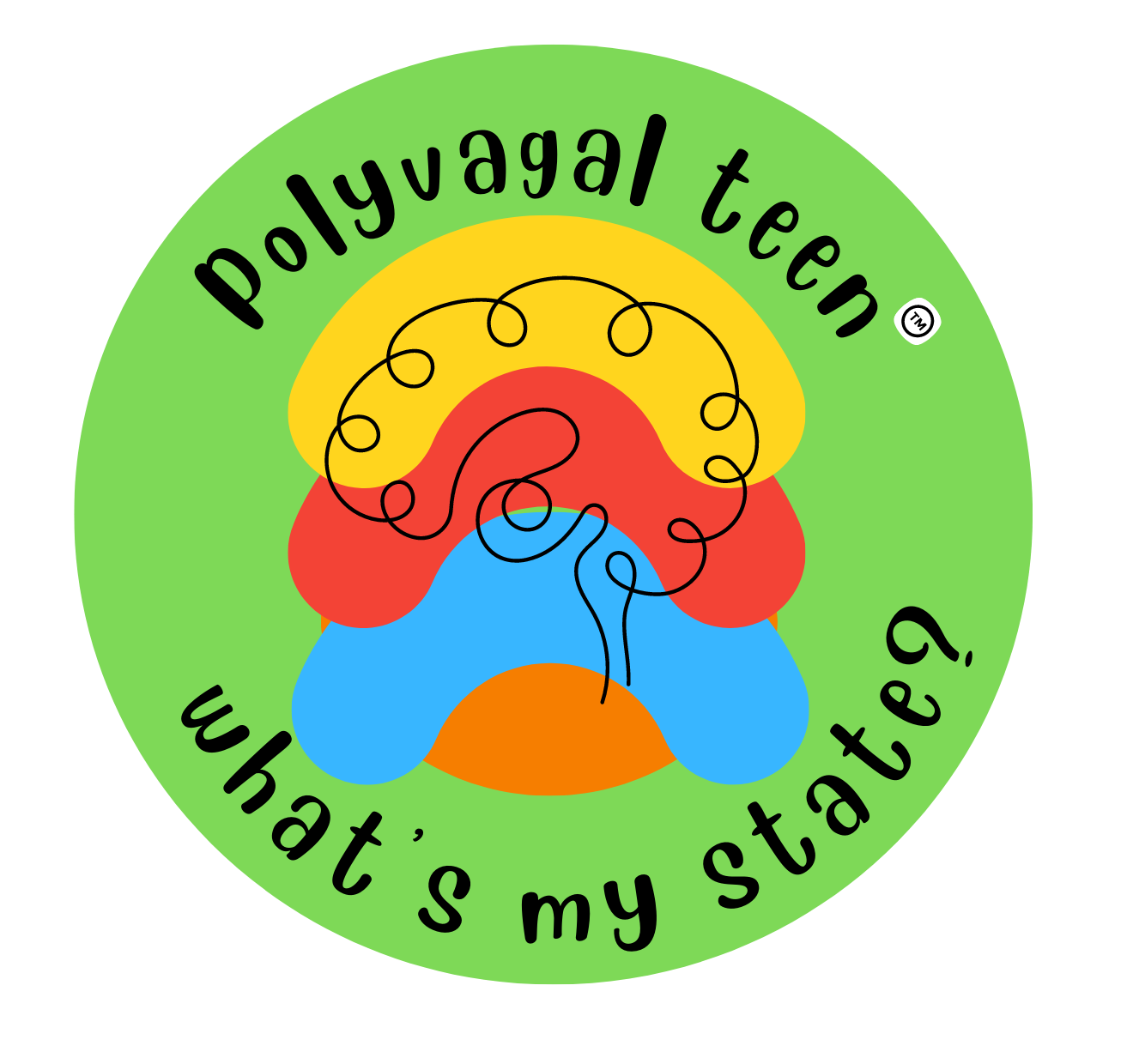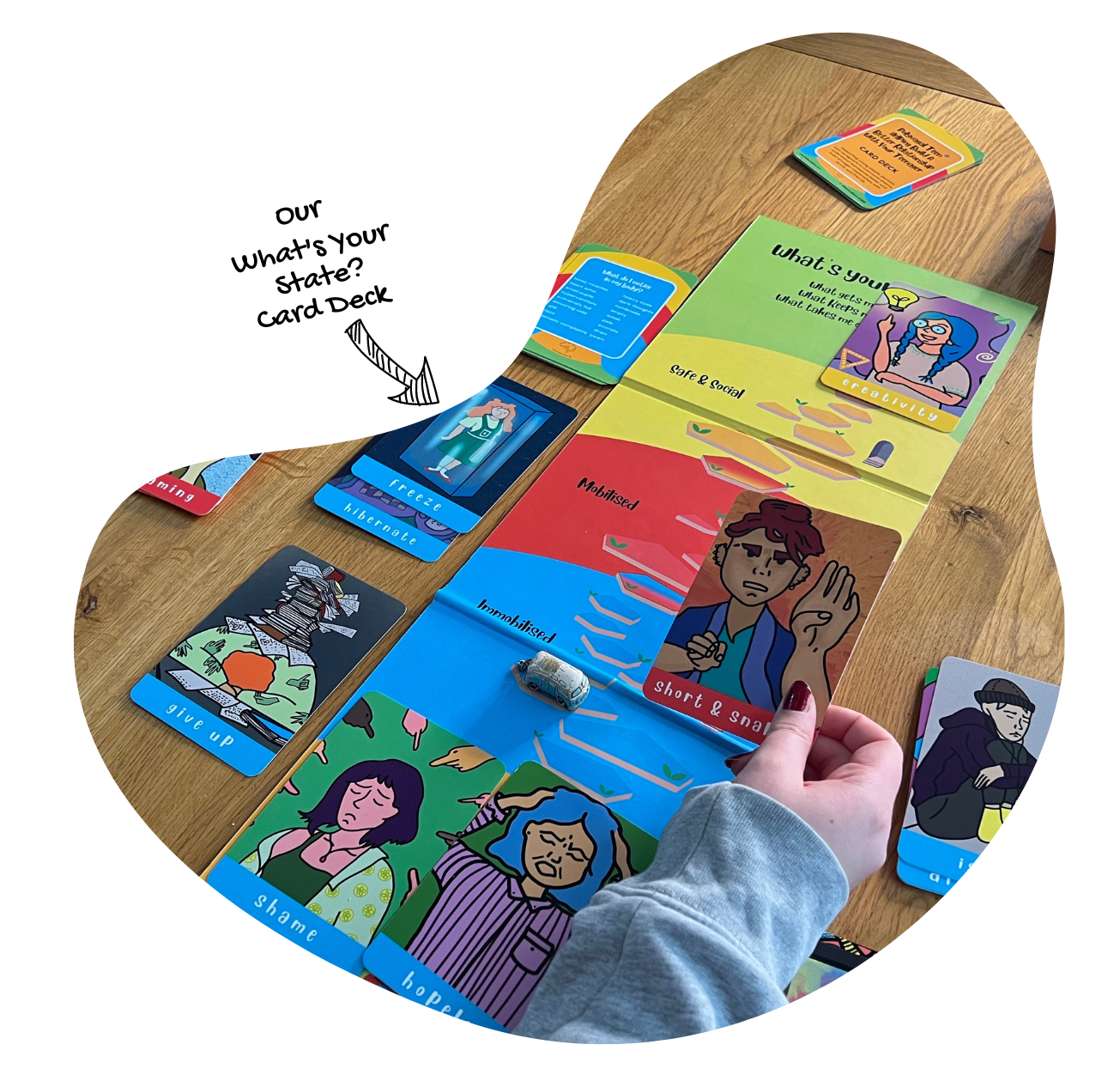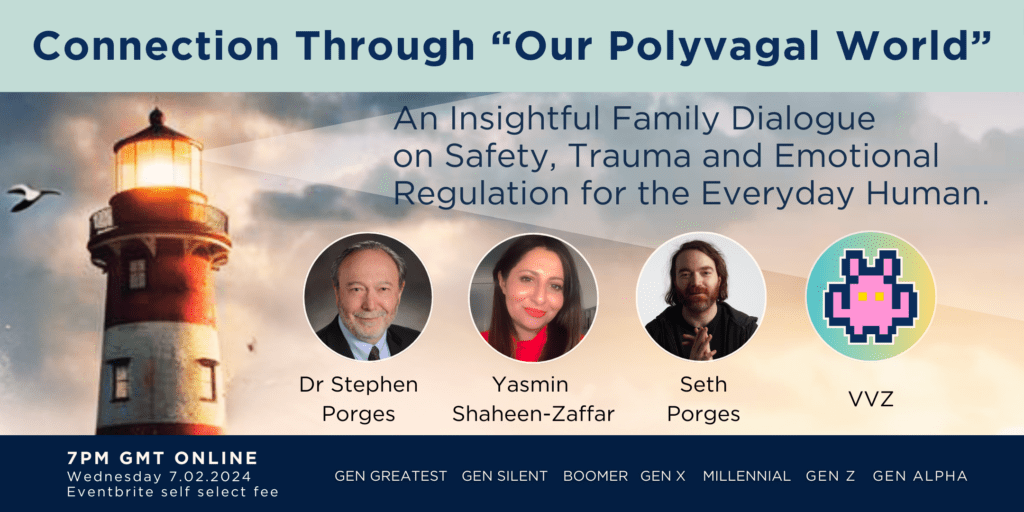Home » Educators Train the Trainer
Is it important for your school to dismantle barriers to learning and create an environment where students feel safe, connected, and engaged in learning?
Our message is being trauma-informed alone is no longer enough - let's work to go beyond! Through Polyvagal Teen® psychoeducation resources and training - we also aim for trauma prevention, stress reduction and cultivation of safety and connection in our communities. Whilst raising awareness of the adverse impact socio-economic challenges have on our nervous systems and relationships.
The Polyvagal Teen® "Educators - Senior Mental Health Lead - train the trainer" program uses principles of polyvagal theory. It is an innovative approach to creating conditions for connection and safety throughout the schools ecosystem, giving both students and educators space for learning, collaboration, and growth. It starts with the trainer's own nervous system first – providing them with ways to feel safe enough to create those same conditions for their school ecosystem.
Imagine engaging classrooms where teachers are poised calmly and confidently at the front of the room without having to fear outbursts or disruptions from their students – all while helping keep them safe from deeper psychological trauma that could be caused by trauma-inducing teaching methods.
In this kind of environment, your students will gain access to tools they need which help foster emotional regulation as well as productivity.
The tools and practices of Polyvagal Teen® also can help to shred stress, prevent burnout and begin healing by equipping educators with the resources to recognise and bring regulation to their own nervous system— supporting connection and learning.
About Polyvagal Teen® - Train the Trainers Program
During the program, participants will gain insights into the advantages of adopting a whole school or college approach and the duties and expectations associated with the senior mental health lead position.
They will also learn about the critical factors necessary for leading strategic change and implementing a successful approach. Effective collaboration with various stakeholders, including the senior leadership team, Governors, parents/carers, pupils, and staff in mandatory roles such as SENCOs, Designated Safeguarding Leads, teachers, and Virtual School Heads, is crucial for delivering a comprehensive approach.
Additionally, the course will explore how the senior lead role fits into the broader mental health system, enabling the best use of mental health support services provided by the NHS, Local Authorities, and Voluntary and Community Sector partners.
Participants will have the opportunity to explore existing best practices in schools and colleges and how sharing experiences and practices contributes to maintaining an effective whole school or college approach.
Finally, participants will learn about the significance of gathering and assessing data to support the implementation of a whole school or college approach.
In this training through a polyvagal informed lens, leaders will gain knowledge about several key aspects related to mental health and wellbeing in schools and colleges, including:
- Understanding the impact of poor mental health and wellbeing on children and young people’s readiness to learn, as well as other indicators such as attendance, attention, behaviour, and attainment.
- Recognising the importance of measuring the mental health needs of the entire school or college community and monitoring the impact of interventions to assess progress and adjust the approach as needed.
- Identifying the range of mental health issues that are common in educational settings, along with the risk factors associated with specific groups, such as those who have experienced trauma, vulnerable groups like children with social workers, those who have been in care, young carers, those with special educational needs, and those from ethnic minority backgrounds.
- Understanding how life experiences can contribute to fluctuations in mental health and wellbeing.
- Learning to differentiate when an education or health intervention would be more appropriate for meeting the needs of a child or young person, particularly in relation to special educational needs and disabilities (SEND).
- Becoming familiar with the tools used by mental health professionals to assess and measure the outcomes of interventions.
- Discovering how to effectively monitor the impact of interventions in their own setting, including collecting data on attendance, behaviour, and attainment, and soliciting feedback from children, young people, and families.
During the course through a polyvagal aware™ lens , leads will acquire knowledge on:
• the different types of statutory and independent mental health services typically available in each local area, the specific needs each service caters to, and the circumstances when it’s appropriate to access them as part of a whole school or college approach.
• the significance of establishing robust partnerships with local services and the broader community.
• the criteria for referring to various services, including the NHS children and young people’s mental health services (CYPMHS, previously known as CAMHS), and the extent and limitations of what the NHS can provide.
Through a polyvagal aware™ lens , the program will cover:
• The significance of staff taking care of their mental health and wellbeing.
• The importance of working with staff to foster and maintain a positive culture of mental health and wellbeing.
• Evidence-based methods for promoting mental health and resilience for both staff and students,
- such as trauma-informed care,
- counseling,
- mindfulness,
- creative approaches.
- The course will highlight the role these techniques can play as part of a comprehensive polyvagal aware approach.
- Supporting staff with mental health issues or incidents in the school/college by directing them to appropriate resources and arranging appropriate support.
Through a polyvagal aware™ lens , the program will cover:
• The significance and potential implications of cross-cultural contexts, health disparities, disadvantage, discrimination, and vulnerabilities within the school/college community and the local area, and how they can relate to and affect mental health.
• The critical nature of staff, children, and young people’s relationships in fostering wellbeing, a sense of belonging, and positive attitudes toward school or college.
• The broader interventions that children and young people may be undergoing, such as involvement with the justice system or social services, and how these can affect mental health and wellbeing.
• The importance of creating a culture and environment that fosters positive learning behaviors and relationships, promotes emotional safety, and prevents any form of bullying or violence.
Through a polyvagal aware lens, enabling the student voice – the course will cover:
• The significance of students’ and pupils’ contributions in developing an inclusive whole school or college approach.
• The importance of ensuring that a variety of voices are heard, reflecting the diversity of the student and pupil community.
• Various strategies for engaging with students and pupils who have different communication needs or preferences.
• How and why to provide feedback to students about the impact of their participation or consultation. Leads will be able to:
• Develop effective plans to empower and involve students and pupils, including those with additional needs and communication difficulties, in co-producing and embedding the whole school or college approach.
• Identify opportunities for the appropriate use of student or pupil-led mental health support.
Collaborating with Parents, Families, and Caregivers To foster a cohesive team effort for the benefit of pupils and students, with a shared set of goals and consistent strategies.
What leads will learn about:
• The significance of effective communication with parents, families, and caregivers in the local community to implement a comprehensive whole school or college approach and to promote the mental well-being of individual pupils and students.
• The barriers that may prevent some parents, families, and caregivers from engaging in the process.
• Techniques for making the school or college environment more approachable and welcoming to parents, families, and caregivers.
• Polyvagal informed strategies for effectively engaging parents, families, and caregivers in supporting mental health, even when faced with difficult relationships or distressed individuals.
Collaborating with Parents, Families, and Caregivers To foster a cohesive team effort for the benefit of pupils and students, with a shared set of goals and consistent strategies.
What leads will learn about:
• The significance of effective communication with parents, families, and caregivers in the local community to implement a comprehensive whole school or college approach and to promote the mental well-being of individual pupils and students.
• The barriers that may prevent some parents, families, and caregivers from engaging in the process.
• Techniques for making the school or college environment more approachable and welcoming to parents, families, and caregivers.
• Polyvagal informed strategies for effectively engaging parents, families, and caregivers in supporting mental health, even when faced with difficult relationships or distressed individuals.
Our programs are aimed at the school ecosystem – staff – teachers, classroom support, head teachers, senor staff, deputy head teachers and admin staff.
We offer a “Train the Trainer” programme also.
It covers Key Stage 3, 4 and 5.
The Polyvagal Aware Classroom training is customised for each specific year from Years 7 through to Years 13 as well as teaching and support staff.
The lesson plans cover the core themes of Health & Wellbeing and Relationships for PHSE.
Each year focuses on age appropriate adolescent issues such as transitions, friendships, relationships, school exclusion, neurodversity and teen behaviour such as gaming, risk taking, gangs or gaming.
If your individual school is facing a crisis incident – custom created programs can be delivered offering a “trauma-informed and beyond” approach.
There are two ways the program is delivered
Online Self Paced with drop in clinic
Our inhouse training platform provides you with the latest advancements to study at your own pace, granting access to a variety of interactive online tools and interventions for learning.
For a period of six months, staff can take advantage of our Polyvagal Aware drop in clinic – 2 hours group Q&A every month to delve into strategies and receive answers for their pre-submitted questions. This hands-on guidance sums up to 12 valuable hours that will help shape the most effective solutions possible!
Our online training platform provides students with a unique learning experience, arming them with interactive creative interventions and tools that will ensure they feel comfortable and confident delivering their learning to their ecosystem.
Designated 2 day Training Day
Lasting 12 hours in person live or online. They will additionally benefit from the drop in clinic Polyvagal skills clinic. For live in person bookings this is only available to groups over 40 members.
We offer four types of licenses, the include:
- individual teachers
- schools
- trusts
- teacher training institutes
Schools
For online license packages fees begin at £1000.00 per school. This includes all physical & digital resources and access to our online training platform.
For inhouse training – please book a call to discuss your needs.
Trusts & Authorities & Institutions
Please contact us for a customised quotation.
Book a call with our team to discuss your schools or trusts educational needs – click here.




